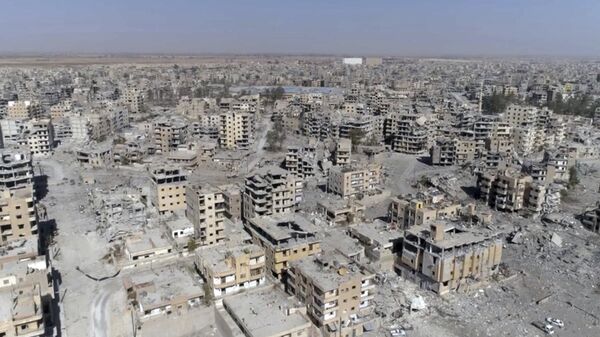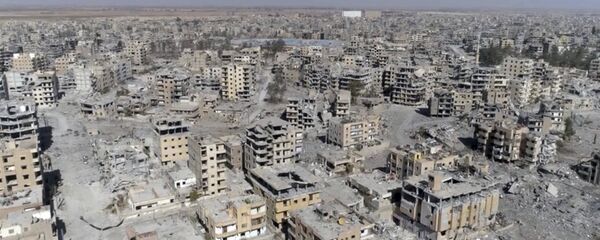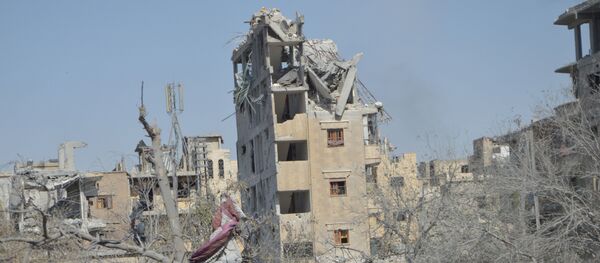While the Pentagon claims that it conducted a precision air campaign in Raqqa, the facts on the ground prove otherwise.
Amnesty International's report, released on June 5, exposed that the US-coalition's four-month military operation to oust Daesh (ISIS/ISIL)* from Raqqa left hundreds of civilians dead, injured many more and left most of the city in ruins.
However, when responding to the human rights watchdog's criticism, the US Department of Defense claimed that "no one will ever know" how many civilians were killed.
"As far as how do we know how many civilians were killed, I am just being honest, no one will ever know. Anyone who claims they will know is lying, and there's no possible way," US Army Col. Thomas Veale, a spokesman for the US-led anti-Daesh coalition, told a Pentagon briefing via video link.
The much-discussed report entitled "'War of annihilation': Devastating Toll on Civilians, Raqqa — Syria" revealed the US-led coalition launched "disproportionate or indiscriminate" attacks on buildings full of entrapped civilians "using wide-area effect munitions." The human rights watchdog raised the question whether the coalition conducted "rigorous surveillance prior to the strikes."
"I don't understand why they bombed us… Didn't the surveillance planes see that we were civilian families?" asked Rasha Badran, an air strikes survivor, whose 39 family members including a one-year-old girl named Tulip were killed in three separate US coalition strikes.
Stressing that the Coalition's strikes potentially amount to war crimes, Amnesty International has called upon the US-led coalition to "promptly and impartially investigate allegations of international law violations and civilian casualties" and to "provide reparation to the victims and adequate assistance for the desperately needed demining and reconstruction work."
It is not the first time that journalists and human rights organizations have raised the alarm over the US coalition's actions in Syrian airspace and on the ground.
Samuel Oakford, an investigator with a number of US media outlets, bemoaned the fact that the US is "in denial" about civilians it had killed in Raqqa in his op-ed published by Foreign Policy magazine on August 31, 2017.
Citing the findings of monitoring group Airwars, the journalist suggested that 1,700 or more civilians had "likely been killed by US-led air and artillery strikes in Raqqa governorate since March [2017]."
However, the Pentagon snubbed the assessment with Lt. Gen. Stephen J. Townsend, Combined Joint Task Force — Operation Inherent Resolve, dubbing reports of large-scale civil casualties in Raqqa as a "hyperbole."
New @airwars interview up w/ member of team digging up bodies in Raqqa, 7 months after the city's capture. They've recovered 700, but many more remain buried. Here are workers digging up a mass grave at Raqqa's al Rashid Stadium. Read the whole interview: https://t.co/bYRTmZFn3u pic.twitter.com/2QkTdhPxyW
— Samuel Oakford (@samueloakford) 30 мая 2018 г.
In general, serious misconduct during the US Raqqa operation has attracted far less attention that the Syrian-Russian liberation of Aleppo from terrorists — November-December 2016 — which was heavily blasted by Western mainstream media outlets. However, the media criticism abruptly ended after the city was liberated by the Syrian Arab Army.
Speaking to Sputnik, Konstantin Truyevtsev, associate professor at the Higher School of Economics, pointed to certain flaws in the US military strategy in Syria.
"The bombing of densely populated cities — what the United States did in Syria — is by no means an effective measure," the Russian academic stressed. "The method chosen by Russia was better, since it [primarily] targeted Daesh oil infrastructure, which is much less destructive."
Kozhin underscored that multiple reports coming from various sources "completely undermine the official Western myth on the so-called liberation" of Raqqa.
"Most of Raqqa was wiped off the map, while large and yet uncounted part of its population was martyred and buried under the rubble," the diplomat told RT.
The Raqqa campaign, codenamed Operation Wrath of Euphrates was launched by the US-backed Syrian Democratic Forces (SDF) against Daesh in Raqqa Governorate in November 2016 and was officially ended on October 20, 2017. The Battle of Raqqa, the final phase of the operation, took place between June 6 and October 17, 2017 with the assistance of US Air Forces. The US and its coalition members have been operating in Syria since 2014 without the approval of the Syrian government or a mandate from the UN Security Council.
* Daesh (ISIS/ISIL/IS) is a terrorist group banned in Russia.




